
Dr Junaid Mohammed, Soviet trained medical doctor and core PRP partyman in the Second Republic
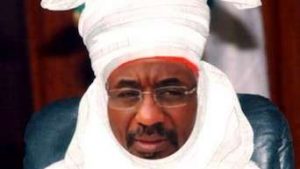
Muhammadu Sanusi 11, the Emir of Kano
Is it the case that the higher incidence of poverty in the north of Nigeria is a function of the nature of the northern elite, since the elite drive reality in every society and its class character must necessarily explain poverty or prosperity in the society? For Muhammadu Sanusi 11, the answer is yes. This is the import of his lampooning of northern leaders recently in Kaduna. But in an intriguing switch in class politics in northern Nigeria, Dr. Junaid Mohammed, a radical of the defunct People’s Redemption Party, (PRP) is interrogating the class analysis of Sanusi, a member of the oligarchy. In an interview with The Nation, Dr Mohammed wondered whether the northern elite is different from their counterparts in the other regions in Nigeria. In doing so, he touches an old but ever present controversy about the origin and nature of the ruling class in northern Nigeria.
That debate arguably climaxed at the conference on “Marx and Africa – A Hundred Years After” held at the Ahmadu Bello University, Zaria in 1983. The closing session of the conference was turned into a fierce confrontation between protagonists and ‘antagonists’ of the People’s Redemption Party, (PRP). The confrontation was the culmination of several battles that raged between the two sides before, mainly at ABU, Zaria and which the closing session which was on the PRP merely provided a fertile site for continuation. Many issues were involved in the debate but the key question was that of the class enemy of the PRP revolution then going on in Kano and Kaduna States under the late Muhammadu Abubakar Rimi and Abdulkadir Balarabe Musa respectively.
For the “PRP revolutionaries” (that is the group of party ideologues led by the late Bala Usman and derisively called Bala Brought Up), as well as Abdulkadir Balarabe Musa whose government they served, the class enemy was the Northern oligarchy which they distinguished from other fractions of the elite in the North by saying that “The nature of this oligarchy itself is distinct because it is made up of people who have go to the position they are not because of any personal capacity of achievement but because of birth, favour, patronage and privilege. They rose to where they are today through the native authorities, the NPC (Northern People’s Congress); the hierarchies of regional, federal and state civil services and parastatals; and the police and Armed forces, not because of their ability but because of their birth, background, privileged connection and patronage”. This was the conception of the oligarchy Governor Abdulkadir Balarabe Musa disseminated at the news conference in Lagos from which he never returned to Kaduna following his impeachment and subsequent detention in Lagos. The world news conference was titled “Why They Fear Our Forces of Progress”.
However, a group of scholars who went by the name ‘the Zaria Group’ challenged the scientificity of this concept called Northern oligarchy as the enemy of the revolution and the people by the PRP or the section of it responsible for the concept. In partial agreement with the conclusion of Dr. Ibrahim Tahir whose doctoral thesis at Cambridge University titled “Scholars, Sufis, Saints and Capitalists in Kano” argued that a commercial revolution had taken place in Kano, making the traditional aristocracy dependants of the new elements thrown up by that ‘revolution’ Zaria Group scholars said no one could reasonably talk of an oligarchy in terms of political authority anymore in the North.
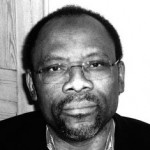
Professor Raufu Mustapha, of the Department of Political Science @ Ahmadu Bello University, Zaria at the time of the debate in question
While Dr Raufu Mustapha, the Zaria Group leading attacker on the PRP intellectuals at the time accepts Tahir’s conclusion, he expressed reservations regarding the degree of the transformation and the place of the aristocracy thereto. He did not think much of the notion of Northern oligarchy in 1979 beyond an anachronistic, mythical nonsense with particular reference to the definition of this oligarchy. He smelt Parsonian sociology and its discursive patterns variable in the definition, wondering where achievement had not been a consequence of accident of birth, favour, privilege, patronage and connection in the capitalist order.
He would have preferred the oligarchy to have been identified in terms of the social source of its power, not its aristocratic Fulani or feudal origin. He is more impressed with the analysis of the Kaduna Mafia especially as developed by Professor A.D. Yahaya and other scholars who saw it in terms of class formation and ruling class politics whereby, from the constitution and re-constitution of property relations both in the Sokoto caliphate and the emergent nation, a class emerged which was “a class of technocrats who owe their power and influence to their control of the bureaucratic machine and access to sources of patronage under the military. In other words, Dr Mustapha agreed with that analysis in view of the fact that it identified this class with a social basis of power and source of wealth – control of bureaucracy and patronage. That is, not just patronage but patronage under the military. Northern oligarchy thesis lacks that precision and tends to suggest a kind of rabid obsession with elements beyond which its protagonists do not wish to or cannot see further than when talking about constructing a new Nigeria.
Whether one found the BBU position about the Northern oligarchy thesis or Dr Mustapha’s critique of it more acceptable about the nature of the elite in the north, the question of whether that elite is different from their counterpart is still not resolved. If the thesis of Northern oligarchy is accepted, concepts such as birth, favour, patronage and privilege that define that thesis all point to the feudal origin of the members of the oligarchy in question. The implication is that Northern oligarchy thesis can only establish their difference if there had been no feudalism elsewhere in Nigeria. The evidence available doesn’t show that. On page 38 of Towards Progressive Nigeria edited by Dr. Asikpo Essien-Ibok out of one of the Government House, Kano conferences under Governor Abubakar Rimi in 1983, Herbert Ekwe-Ekwe’s list of where feudalism had existed stretched from Northern and Western Nigeria to Japan, Britain, Holland, Belgium and the Monarchies of Scandinavia. Northern oligarchy would, therefore, not prove the difference being sought. What of the Kaduna Mafia argument? Given the centrality of ‘patronage under the military’ in the Kaduna Mafia analysis and given the prolonged presence of the military in power, there the difference between the northern elite and their counterparts must lie. Although the Kaduna Mafia and the oligarchy proper do not refer to the same class fractions, that distinction will not be pursued in this piece.
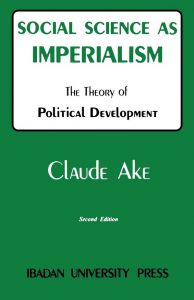
The cover of one of the late Prof Ake’s works. It is used here in lieu of a clear enough picture of Ake from the internet
Delivering the Presidential Address titled “The State of the Nation” to the Annual Conference of the Nigerian Political Science Association in Jos in 1983, the late Professor Claude Ake differentiated the UPN which was basically a Southwestern Nigerian elite affair from the NPN in words that cannot but be quoted in full as follows: “In the case of the UPN, it core leadership comes close to being a bourgeoisie in the orthodox sense for it has a fairly well established base in commerce and industry. It is also beginning to acquire the sophistication of an established bourgeoisie. The UPN would ensure a more rational organization of capitalism in Nigeria and it appears to understand the necessity for defensive radicalism. By its nature, it is more disposed to discipline, efficiency and productive capitalism (orthodox capitalism). To this extent, it is more progressive. However, the UPN is ultimately a more conservative force than the NPN in so far as it is more entrenched in capitalist production and far more adroit in its defence of capitalism”.
Basically, Ake argued a distinction between the northern and southwest elite in terms of maturity or lack of it in capitalist terms. Does anybody else support Ake? Scholars such as Jibrin Ibrahim argue that there was a transition in the politics of northern elite in the Second Republic from petty bourgeois regional politics to ‘full-fledged’ bourgeois politics. The political project of the NPN, he said, was the development of a national system for the distribution of the “national cake” as means of assuring the continued development of a Nigerian bourgeoisie. That cake refers to federally generated resources made available for political appropriation by the Nigerian State”. He makes the clarification that it did not mean that regionalism had disappeared from the political landscape but that the class fractions with roots in the regional process of accumulation which characterized the First Republic were now heeding a clarion call for all fractions of the bourgeoisie to come together in order that ALL in this class might partake of the ‘national cake. That was the NPN which was as national as it was northern.
Prof Ibrahim is, by implication, supporting Ake’s claim by linking the transition to a pattern of accumulation signposted by the idiom of the national cake, another name for prebendalism. Prebendalism, it is asserted, is why the north has been able to tighten rather than lose grip on power for fear of domination or losing certain advantages. In 1994, Balarabe Musa came up with the analogy about the politics of the northern elite: “What has always happened in Nigeria is class dominance. There is a clique in the North which is so experienced, so ruthless that it can easily secure, align States in the North, more successfully than its Southern counterpart and for that reason, they can always prevail over what the rest of Nigerians think”. (See Balarabe Musa: “It Could Have Been Worse”, Weekend Concord, April 16, 1994). In other words, the northern elite was usually more skilful in reaching into other regional voting blocks and winning elections than the others, perhaps as part of the training in how to keep state power.
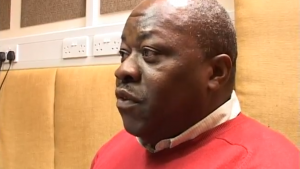
Prof Jibrin Ibrahim also of the Department of Political Science, ABU, Zaria where he presented his paper on the NPN in June 1989
So, in all cases, all witnesses called in this case argue a fundamental difference between the northern elite and their regional counterparts in the East and the West. The difference is its over-reliance on the Nigerian State for accumulation and for its own class survival. What is suggested in that is its lack of maturity in capitalist terms, a point which unites Emir Sanusi, Claude Ake and Jibrin Ibrahim in this controversy, although it is a long time now and no one knows if Ake or Ibrahim would have shifted position by now. But one outcome of their position is the psychological satisfaction with being in power on the part of the northern elite even if that has meant holding the cow for others to milk. Privileging power at the expense of leadership in a dysfunctional, rentier state has alienated it from its base to the point that the northern elite is now even derided as in Emir Sanusi’s intervention. That makes the Emir to be on stronger grounds than Dr Junaid Mohammed who asked whether the northern elite are different from their counterparts in the other regions. The verdict above captures the difference very clearly.
There is nothing criminal in being tied to the state but there is a problem if that becomes the essence in itself rather than as a means to something for the people. Nothing stops the northern elite from demanding its own share of the regional allotment under the zoning principle but, hence, that must come with the essence. It is not as if politicians in Nigeria have any sense of the tradition of popularizing any developmental strategy but where the lack of development discourse has led to an extremely dangerous poverty level as in the north, then such discourse has become a minimum requirement because it can no longer be business as usual. In 2019, any contender to presidential power who is popularizing no development strategy document outlining what he intends to do and how he would do that will only be a pretender. The time for living in denial is over. That would appear to be the message of the Sanusi advocacy.
It is such an interesting thing to see the switch in position today. That is the fact that Muhammadu Sanusi 11, a member of the oligarchy is the one speaking the language of the PRP in the current debate while it is PRP elements such as elder statesman Tanko Yakassai and Dr Junaid Mohammed who are his critics. Of course, Tanko Yakassai remained his essential NEPU self and even Dr Junaid’s criticism of over-generalisation on the part of the emir requires reflection. Nevertheless, the current switch must intrigue many. It must be a thing of joy for many to see Balarabe Musa adding value to the Emir’s intervention by finding a conceptual haven for it in the idea of uneven and combined development by which capitalism works and which explains coexistence of spaces of extreme poverty with spaces of extreme wealth across the world. That’s capitalism at work, not God.
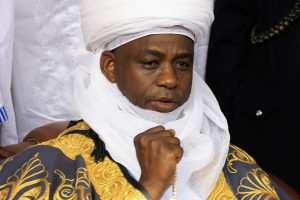
Alhaji Saad Abubakar 111, the Sultan of Sokoto,
Might the Emir of Kano be at risk? This is the fear but at risk from where? Hasn’t the situation on ground in the north radicalized everyone, including the Sultan of Sokoto? At the same occasion in Kaduna, he called for the politics of development. That’s “So, let’s put the building of airports and other white elephant projects aside and face issues that will bring water, food, good health, peace, security and make people go about freely without molestation”. That’s an even more subtle attack on the incoherence going on. Hasn’t Nigeria gone beyond that?
*This piece has adapted sentences from The Populist Factor in Nigerian Politics by the author and two others, coming up for re-publication in due course.




























